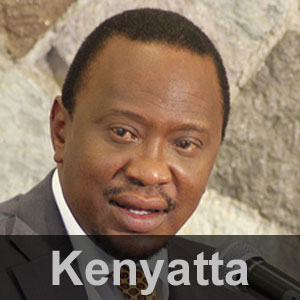|
|
||
|
Kenya's deputy prime minister has shrugged off allegations of crimes against humanity in his race for the presidency.
| ||
|
Avid Twitterer Uhuru Kenyatta is
no stranger to the limelight. The son of Kenya's first president, Uhuru
["freedom"] seemed destined for political fame from his earliest days.
And he's not letting allegations of crimes against humanity stand in the
way of his presidential ambitions. The 51-year-old deputy prime minister, a graduate of Amherst College in the United States, was elected chairman of his hometown branch of ruling party KANU in 1997. His inherited family business empire oversaw five-star hotels, airlines and commercial farming, and it was with this background that President Daniel arap Moi appointed him to run the Kenya Tourism Board in 1999 - a position in which he was introduced to some of the country's most important power-brokers.  Nominated to parliament in 2001, his career accelerated as President
Moi endorsed Kenyatta as his successor just a year later. Despite losing
to Mwai Kibaki by a substantial margin in that attempt, Kenyatta, of
the Kikuyu tribe, backed the 2007 re-election campaign of Kibaki, a
fellow Kikuyu. Nominated to parliament in 2001, his career accelerated as President
Moi endorsed Kenyatta as his successor just a year later. Despite losing
to Mwai Kibaki by a substantial margin in that attempt, Kenyatta, of
the Kikuyu tribe, backed the 2007 re-election campaign of Kibaki, a
fellow Kikuyu.
The same cable also claimed that Kenyatta had been closely linked with the Mungiki, originally a conservative Kikuyu movement "which has long since morphed into a well-organised Mafia-style criminal organisation". Social media Despite these allegations, he has won praise for his Economic Stimulus Programme as minister of finance, investing in food security and boosting entrepreneurship and innovation. He also made headlines around the world when he insisted that cabinet ministers and other officials give up their Mercedes government cars in favour of Volkswagen Passats. Kenyan lawmakers have, however, still managed to get by - parliamentarians receive monthly salaries of around $11,000 each, in a country where the average monthly wage is just $140. Online fans have also been impressed with Kenyatta's embrace of social media. In 2011, Kenyatta tweeted to his followers, asking them to give their views on the country's national budget via the microblogging service. Hundreds responded within hours in an exercise which was praised by tech-oriented politicos as extending inclusivity and empowering democracy. However promising for democracy Kenyatta's use of technology may be, the allegations against him surrounding the botched 2007 elections cannot be ignored. Just a month after Kenyans go to the polls on March 4, Kenyatta is due to face trial at the International Criminal Court in The Hague. He is charged with crimes against humanity, accused of hiring the quasi-cult criminal Mungiki fraternity to target Luo groups and villages in the aftermath of the disputed poll. He denies the charges and has asked for the trial to be delayed. In recent weeks, it has also emerged that key witnesses due to give evidence in the trial, have mysteriously "disappeared". Kenyatta's running mate, William Ruto, is also among those charged by the ICC. His platform is focused around three key areas: Ethnic and tribal unity, economic growth and political transparency. The TNA coalition's manifesto pledges to boost police pay, enforce a "buy Kenyan" procurement approach for the armed forces and to "fight the menace and impeding threat of al-Shabaab's terrorism". The party has also promised to upgrade hospitals through private sector investment, distribute free mosquito nets and give tax breaks to private investors in the sports, arts and entertainment sectors. Kenyatta has, like Odinga, pledged to increase health spending to 15 percent of the national budget. At the beginning of February, Uhuru was trailing Prime Minister Raila Odinga in opinion polls, 40 percent to 46 percent, but more recent surveys have the pair neck-and-neck. |




No comments:
Post a Comment